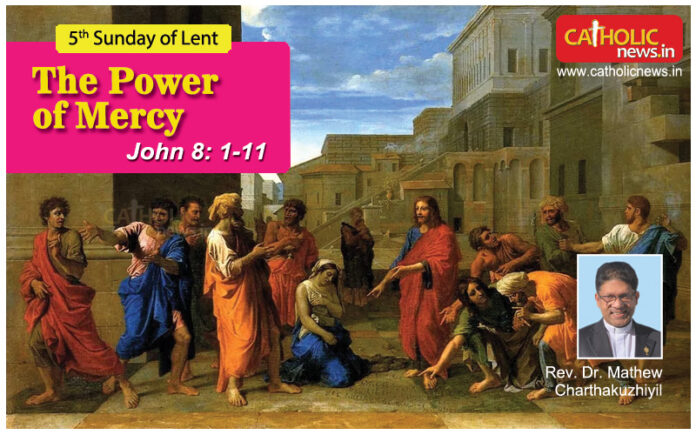
We are approaching the end of our Lenten journey, and today, on the Fifth Sunday of Lent, the Gospel presents us with a profound story of mercy and redemption. This passage highlights Jesus’ immense compassion as he saves a woman caught in adultery from condemnation and death. It is not just the woman who is put to the test, but Jesus himself, as the scribes and Pharisees seek to trap him.
The woman stands in the center, accused and humiliated. According to the Mosaic Law, she should be stoned, but the religious leaders are not truly seeking justice; they are using her to challenge Jesus. If he supports the law’s punishment, he would contradict his teachings on mercy. If he releases her, he would be seen as disregarding the law of Moses. They believe they have placed Jesus in an impossible situation. But Jesus, full of divine wisdom, does not respond immediately. Instead, he bends down and writes on the ground with his finger. What was he writing? We do not know. Perhaps he was reminding them of their own sins. Perhaps he was recalling how God wrote the law on stone tablets for Moses. Whatever it was, his response is stunning: “Let the one among you who is without sin be the first to throw a stone at her” (John 8:7).
A deep silence follows. The crowd, so eager to condemn, now looks inward. One by one, they walk away, beginning with the eldest, who perhaps have the most sins to recall. Soon, only Jesus and the woman remain. He looks at her with kindness, asking, “Woman, where are they? Has no one condemned you?” When she responds, “No one, sir,” Jesus delivers his merciful judgment: “Neither do I condemn you. Go, and from now on do not sin anymore” (John 8:11). What an incredible moment of grace! Jesus does not dismiss the seriousness of sin, but he prioritizes mercy over judgment. He does not condone what she has done, but he offers her a future free from shame and sin. This is the heart of the Gospel: God’s love is greater than our failures, and his mercy is always available.
This story invites us to reflect on two key points. First, how often do we act like the scribes and Pharisees, quick to judge others while ignoring our own faults? We may not carry stones in our hands, but we often hold them in our hearts—stones of resentment, criticism, and self-righteousness. Jesus calls us to drop these stones and embrace compassion. Second, we are also like the woman, in need of mercy. Perhaps we have made mistakes, fallen into sin, or carried burdens of guilt. But Jesus does not condemn us. Instead, he invites us to receive his forgiveness and begin anew. His words to the woman—“Go and sin no more”—are not just a command but an encouragement. He believes in her ability to change, just as he believes in us.
The season of Lent is a time for renewal. It is a time to recognize our shortcomings, not to dwell in shame, but to experience the liberating mercy of God. Like the woman in today’s Gospel, we are given the chance to rise again, free from the weight of our past.
As we continue our Lenten journey, let us ask ourselves: Are we holding onto stones of judgment? Do we allow God’s mercy to transform our hearts? Jesus offers us the same compassion he showed the woman—let us embrace it and extend it to others. May this story inspire us to be people of mercy, forgiveness, and love, reflecting the heart of Christ in our daily lives.
Fr. Mathew Charthakuzhiyil



